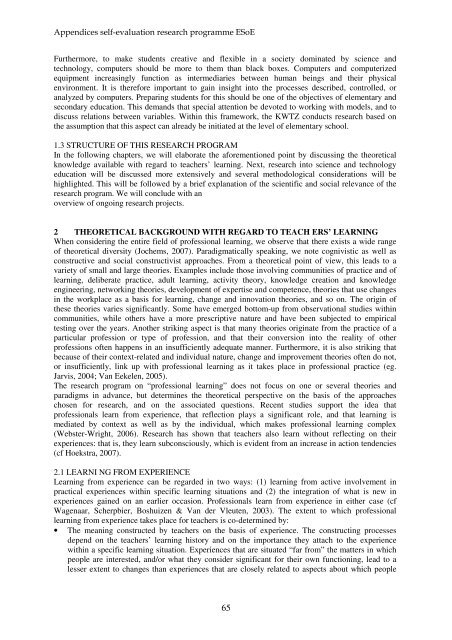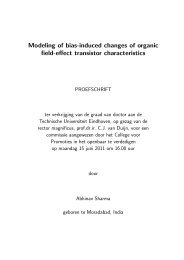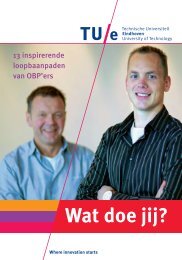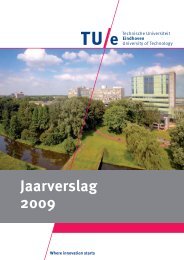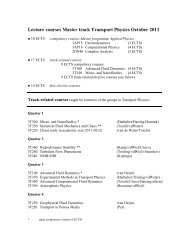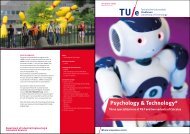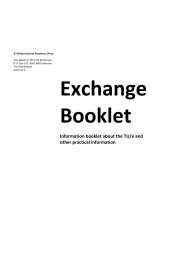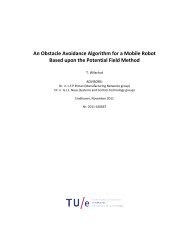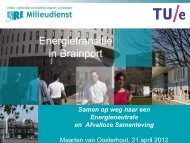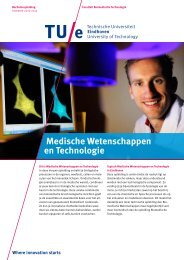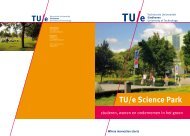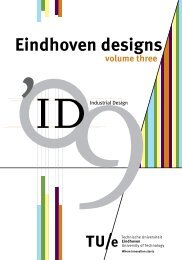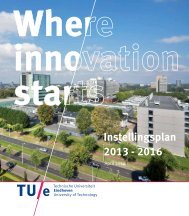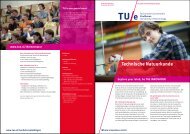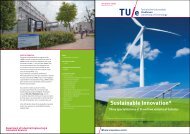Self-evaluation - Technische Universiteit Eindhoven
Self-evaluation - Technische Universiteit Eindhoven
Self-evaluation - Technische Universiteit Eindhoven
You also want an ePaper? Increase the reach of your titles
YUMPU automatically turns print PDFs into web optimized ePapers that Google loves.
Appendices self-<strong>evaluation</strong> research programme ESoE<br />
Furthermore, to make students creative and flexible in a society dominated by science and<br />
technology, computers should be more to them than black boxes. Computers and computerized<br />
equipment increasingly function as intermediaries between human beings and their physical<br />
environment. It is therefore important to gain insight into the processes described, controlled, or<br />
analyzed by computers. Preparing students for this should be one of the objectives of elementary and<br />
secondary education. This demands that special attention be devoted to working with models, and to<br />
discuss relations between variables. Within this framework, the KWTZ conducts research based on<br />
the assumption that this aspect can already be initiated at the level of elementary school.<br />
1.3 STRUCTURE OF THIS RESEARCH PROGRAM<br />
In the following chapters, we will elaborate the aforementioned point by discussing the theoretical<br />
knowledge available with regard to teachers’ learning. Next, research into science and technology<br />
education will be discussed more extensively and several methodological considerations will be<br />
highlighted. This will be followed by a brief explanation of the scientific and social relevance of the<br />
research program. We will conclude with an<br />
overview of ongoing research projects.<br />
2 THEORETICAL BACKGROUND WITH REGARD TO TEACH ERS’ LEARNING<br />
When considering the entire field of professional learning, we observe that there exists a wide range<br />
of theoretical diversity (Jochems, 2007). Paradigmatically speaking, we note cognivistic as well as<br />
constructive and social constructivist approaches. From a theoretical point of view, this leads to a<br />
variety of small and large theories. Examples include those involving communities of practice and of<br />
learning, deliberate practice, adult learning, activity theory, knowledge creation and knowledge<br />
engineering, networking theories, development of expertise and competence, theories that use changes<br />
in the workplace as a basis for learning, change and innovation theories, and so on. The origin of<br />
these theories varies significantly. Some have emerged bottom-up from observational studies within<br />
communities, while others have a more prescriptive nature and have been subjected to empirical<br />
testing over the years. Another striking aspect is that many theories originate from the practice of a<br />
particular profession or type of profession, and that their conversion into the reality of other<br />
professions often happens in an insufficiently adequate manner. Furthermore, it is also striking that<br />
because of their context-related and individual nature, change and improvement theories often do not,<br />
or insufficiently, link up with professional learning as it takes place in professional practice (eg.<br />
Jarvis, 2004; Van Eekelen, 2005).<br />
The research program on “professional learning” does not focus on one or several theories and<br />
paradigms in advance, but determines the theoretical perspective on the basis of the approaches<br />
chosen for research, and on the associated questions. Recent studies support the idea that<br />
professionals learn from experience, that reflection plays a significant role, and that learning is<br />
mediated by context as well as by the individual, which makes professional learning complex<br />
(Webster-Wright, 2006). Research has shown that teachers also learn without reflecting on their<br />
experiences: that is, they learn subconsciously, which is evident from an increase in action tendencies<br />
(cf Hoekstra, 2007).<br />
2.1 LEARNI NG FROM EXPERIENCE<br />
Learning from experience can be regarded in two ways: (1) learning from active involvement in<br />
practical experiences within specific learning situations and (2) the integration of what is new in<br />
experiences gained on an earlier occasion. Professionals learn from experience in either case (cf<br />
Wagenaar, Scherpbier, Boshuizen & Van der Vleuten, 2003). The extent to which professional<br />
learning from experience takes place for teachers is co-determined by:<br />
• The meaning constructed by teachers on the basis of experience. The constructing processes<br />
depend on the teachers’ learning history and on the importance they attach to the experience<br />
within a specific learning situation. Experiences that are situated “far from” the matters in which<br />
people are interested, and/or what they consider significant for their own functioning, lead to a<br />
lesser extent to changes than experiences that are closely related to aspects about which people<br />
65


